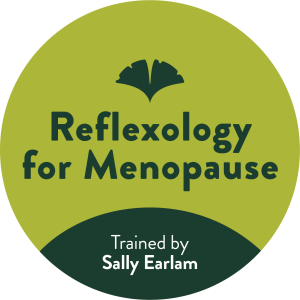May 2025
 The Five Pillars of a Healthy Menopause
The Five Pillars of a Healthy Menopause
Perimenopause and menopause can be a challenging time for many women. There are many symptoms associated with this time, including anxiety, poor sleep, night sweats, hot flushes, mood swings, fatigue, irregular periods, and more. In the UK it is estimated that 80% of women experience some symptoms.
There are, however, many things you can do to help yourself feel better and lessen the impact of declining hormones. Whether or not you decide to take HRT, making lifestyle changes is so important for taking control of your own health and wellbeing.
I am fully trained in Reflexology for Menopause. Reflexology can be a great support alongside other lifestyle changes and/or HRT. It has been shown to be effective for sleep disorders and hot flushes during menopause, a useful intervention to relieve fatigue and promote sleep as well as increasing quality of life and reducing depression *
Reflexologists can support women by giving empathy, support, non-judgemental listening and time to completely relax without any other pressures.
The following areas are important for wellbeing and health at every stage of life but especially during menopause.
Nutrition
Eating a well-balanced diet with plenty of protein and fibre, a variety of plants, fruit and vegetables is essential during menopause. A healthy diet is important for cardiac health, reducing inflammation and maintaining a healthy weight. It can also have a positive impact on any menopause symptoms. Menopause has various effects on the way our bodies respond to food, affecting metabolism and body fat storage. Try to reduce processed foods and those containing added sugar. Consider reducing caffeine intake as this can affect both sleep, hot flushes and anxiety symptoms. Also make sure to drink plenty of water to keep hydrated and energised.
Fiona Hayers of Nourish from Within, is a Nutritional Therapist and Health Coach and can offer advice, support and guidance on nutrition during menopause www.nourishfromwithin.co.uk
Movement & Exercise
Movement and exercise are fundamental throughout life for emotional and physical health and especially important in menopause. Exercise lowers the risk of heart disease, improves bone density, strengthens muscles, flexibility and stability, improves sleep and lifts mood. Strength training is particularly important as it combats muscle loss, helps prevent osteoporosis, increases metabolic rate and can have a positive impact on mental health. It is also important to do weight bearing exercise and try to incorporate some stretching and flexibility work which can be helpful for joint pain. I can highly recommend the following books:
Owning Your Menopause - Fitter, Calmer, Stronger in 30 days by Kate Rowe-Ham http://www.owningyourmenopause.com
The Feel Good Fix. Boost energy, improve sleep and move more through menopause and beyond by Lavina Mehta http://www.feelgoodwithlavina.com
Managing stress & finding time for relaxation
Menopause happens during a time when life may already be stressful. Many women are already juggling work, children and ageing parents. To add to this, the effects of changing hormones can mean many women feel more anxious. Oestrogen and progesterone start to fluctuate and over time fall dramatically. Oestrogen and progesterone are our calming hormones, helping protect us from the effects of cortisol. Anxiety and mood changes are one of the most common and distressing symptoms. It’s important to take time for yourself to counteract the effects of stress and overwhelm.
Self-Care
Try to spend at least 10 minutes a day on relaxation. This could be meditation, journalling, gratitude, yoga. Or it could be going for a walk in nature, listening to music, talking to a friend, reading a book or having a reflexology treatment! Anything that you find calming and enjoyable.
I can personally recommend the free app Insight Timer for many different types of meditation, music and breathwork practices http://www.insighttimer.com
Sleep
Sleep disturbance is common and associated with falling hormones but can also be due to hot flushes, night sweats, frequent urination and anxious thoughts. Progesterone has sleep inducing qualities, but this reduces in perimenopause, along with melatonin. The effects of increased cortisol can also mean waking up in the night and not being able to get back to sleep.
Reflexology can be useful to relieve fatigue and promote sleep and should go alongside a good bedtime routine. Why not try a pillow spray? I use a lavender and rose geranium sleep spray and find it very calming – www.pillowsprays.co.uk
Community and purpose
Being part of a community has positive effects on mental health. This is true throughout life but especially when we may need extra support in menopause. Having purpose and goals in life also helps us to stay positive. Joining a yoga class, taking up a new hobby, volunteering in your community are all good options for increasing social connection.
References
The effects of reflexology on sleep disorder in menopausal women. Maryam Asltoghiri, Zahra Ghodsi. Procedia - Social and Behavioral Sciences, Volume 31, 2012, Pages 242-246 https://www.sciencedirect.com/science/article/pii/S1877042811029788
The effects of reflexology applied to women aged between 40 and 60 on vasomotor complaints and quality of life. Gozuyesil E, Baser M. Complement Ther Clin Pract. 2016 Aug;24:78-85 https://pubmed.ncbi.nlm.nih.gov/27502805/
The effects of reflexology on depression during menopause: A randomized controlled clinical trial. F Mahdavipour et al. Complementary Therapies in Medicine, Volume 47, 2019 https://pubmed.ncbi.nlm.nih.gov/31780002/
The effects of reflexology for menopausal women. Williamson, J et al. BJOG_Oxford, 2002 Vol 109:Number 9, pg 1050-1055
https://obgyn.onlinelibrary.wiley.com/doi/abs/10.1111/j.1471-0528.2002.01504

 The Five Pillars of a Healthy Menopause
The Five Pillars of a Healthy Menopause